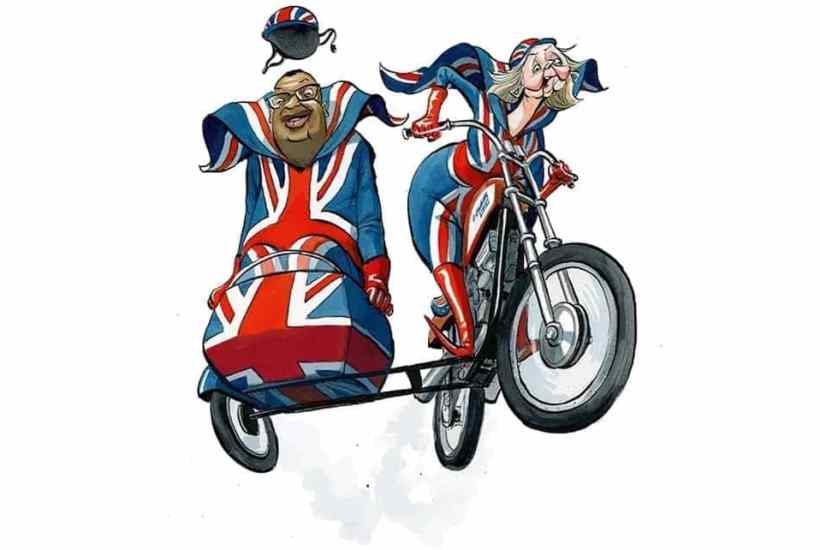When Liz Truss entered the leadership race there was no such thing as ‘Trussonomics’. She began her campaign with no real expectation of winning and without any serious guiding philosophy. Rishi Sunak did her a great service by portraying her throughout the leadership campaign as a crazed tax-cutter, a disciple of Ronald Reagan. But in truth, her economic policy was nowhere near as coherent as Sunak made out.
Truss just about scraped through the soundbite war of the debates, but the fact is she had no real pro-growth, tax-cutting agenda. All she pledged to do during her campaign was to freeze forthcoming corporation tax rises and shave 1 per cent off National Insurance. This she did mainly because the 2019 Tory manifesto promised not to raise tax. Reneging on manifesto pledges damages trust in politics, Truss argued. But this is a tiny tax cut and unlikely to inspire any sort of economic growth.
Kwasi Kwarteng, the Chancellor, talks about a plan to return Britain to 2.5 per cent growth, and he’s right to say that ‘supply-side reform’ is the remedy, but there will need to be a lot more of it to have any hope of producing the sort of growth he has in mind. And it would need to come in many forms. One of the reasons the economy is being held back is that five million people – a scandalous 13 per cent of the potential labour force – are on out-of-work benefits. The government has yet to admit to this figure, let alone come up with a plan to use these people’s talents to better effect. In an economy with 1.3 million vacancies – twice the average of the past decade – there has never been a better time to help the unemployed into work. The first and most precious resource of any economy is its potential workforce, whose talents in Britain today are scandalously underused.
Some of the most motivated people in the country are banned from seeking work and forced to stay on benefits: these are the 96,000 waiting to have their asylum cases heard. Allowing them to support themselves and their families while the process is under way would help to grow the economy, provide relief to the taxpayer and give dignity to the asylum-seeker.
The Prime Minister is right to talk about overall principles: that high taxes make every-one poorer and that you cannot tax your way into growth. Government works best when it gets out of people’s way and confiscates less of what they earn. But this can only meaningfully happen if cuts are also made to state spending. Until this happens, any tax cuts will be temporary and any pro-growth policy illusory.
The most significant Trussonomics proposal so far is the gas price bailout. Julian Jessop, one of the economists whose work has been influential in the new government’s thinking, explains on page 14 why he’s optimistic that this won’t run up the £150 billion price tag feared by the Institute for Fiscal Studies. Since this estimate was drawn up, the price of wholesale gas has halved. Still, on current estimates, the price cap – a classic example of borrow-and-splurge – will end up larger than any tax cut that is in the offing.
Herbert Morrison famously declared that ‘socialism is what a Labour government does’. But Tory governments over recent years have borrowed and spent too, and to no good end. They’ve dismissed spending reform as ‘austerity’ and accepted that more government is the solution to every problem. Boris Johnson was just as bad, making ludicrous and unworkable proposals for the country to reach net zero and subsidising care-home costs for wealthier pensioners.
Every prime minister or chancellor ends up with a reputation for his or her particular economic policy, whether deserved or not. Osbornomics meant doing the right thing and cutting taxes after wasted years of terrified inaction. Johnsonomics was defined by ‘cakeism’: borrow, spend, never say no. The pandemic was a disaster for every country, but Johnson’s response – the extent and length of the lockdowns – left a bill greater than that facing other economies.
Trussonomics should mean repairing that damage. It should mean acknowledging that furlough left a deep, distorting effect in the labour market (especially amongst the over-fifties) and that more needs to be done to coax people back to work. Trussonomics should mean doing a better job of explaining unpopular policies. Every banker’s bonus is now split 50/50 with the government, thanks to progressive tax rates. It would not hurt to make this point. Lifting the cap on bonuses should see extra tax collected from the super-rich and less money needed from others.
As Truss pushes ahead with her own agenda, her government cannot forget the economic mess that still needs cleaning up. Truss must remember that big spending proposals require big trade-offs. She must make sure that her growth agenda is bold and ambitious enough to achieve the desired results. The country can’t afford anything less.
Got something to add? Join the discussion and comment below.
Get 10 issues for just $10
Subscribe to The Spectator Australia today for the next 10 magazine issues, plus full online access, for just $10.
You might disagree with half of it, but you’ll enjoy reading all of it. Try your first month for free, then just $2 a week for the remainder of your first year.














Comments
Don't miss out
Join the conversation with other Spectator Australia readers. Subscribe to leave a comment.
SUBSCRIBEAlready a subscriber? Log in